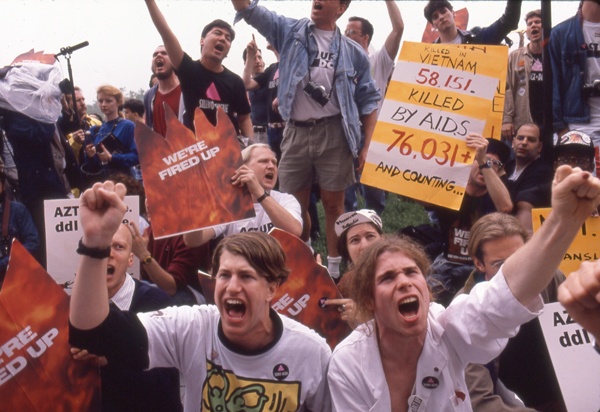
A scene from HOW TO SURVIVE A PLAGUE (Donna Binder/Sundance Selects)
This powerful and highly charged documentary takes us through the pivotal years in the history of the AIDS Coalition to Unleash Power, better known as Act Up, the activist organization that fought against the lack of American institutional response to the AIDS crisis, beginning in the late 1980s. Award-winning journalist David France directs his first film with fervor, offering selections from a short but rich media history of this controversial group. He steers clear of omniscient narration, relying instead on the up-close-and-personal footage recorded during the movement’s most dynamic years, and follows up with talking-head interviews either shot recently or pulled from the time in between.
There’s not a dull moment throughout. The struggle the film identifies is a mortal one: people with AIDS and H.I.V. fighting for greater control over their healthcare and a more constructive coordination in the testing and approval of new treatments. As nobody should soon forget, until the early 1990s, an H.I.V. diagnosis was often a death sentence.
Peter Staley, the de facto hero of the film, is as dynamic and eloquent a figure as you could ask for, speaking out to politicians of all types and putting himself on the front line at nearly protest he attends. The cast of characters is memorable, the speeches are persuasive, and the filmmaking is downright exciting. One recurring element that France carefully interweaves is how the profit motive factors into the crisis. For politicians and pundits like Jesse Helms, Pat Buchanan, and Bill Clinton to become engaged in the issue, it was not only public health or gay rights at stake. When it came to regulating business, namely drug companies and their production of H.I.V.-related drugs, the bottom line was always a concern.
Whether Act Up is your awareness group of choice might be a different story. In a time when the crisis needed simultaneously advocacy and outspoken and reactionary leadership, Act Up came under a degree of fire for its tactics. Thus, France smartly chooses his title, because for those in the thick of the many debates, it was all about survival. As a director, he’s careful to allow us to understand the group’s motives in an objective way, but by the film’s end, it’s clear where he stands regarding the movement.
At its heart, the struggle for AIDS awareness is also about gay rights, and it’s for this reason that How to Survive a Plague still feels so pertinent today, amid Don’t Ask Don’t Tell legislation or gay marriage debates. Staley and his comrades aren’t just fighting for access to lifesaving drugs. They’re fighting to end the stigma, the real plague for homosexuals all over the world. As exciting as it is for young people today to experience what is a historically unprecedented acceptance of gays as a normal, integral part of society, let’s be careful to acknowledge the very recent struggle that helped this country get to this point. Let’s not forget our history.






Leave A Comment